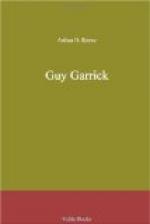“Not unless he might be an employee or a keeper of one of those night-hawk garages,” persisted McBirney. “That is possible.”
“Quite,” agreed Garrick.
McBirney had delivered his own news and in turn had received ours, or at least such of it as Garrick chose to tell at present. He was apparently satisfied and rose to go.
“Keep after that undersized fellow, will you?” asked Garrick. “If you could find out who he is and he should happen to be connected with one of those garages we might get on the right trail at last.”
“I will,” promised McBirney. “He’s evidently an expert driver of motor cars himself; my man could see that.”
McBirney had gone. Garrick sat for several minutes gazing squarely at me. Then he leaned back in his chair, with his hands behind his head.
“Mark my words, Marshall,” he observed slowly, “someone connected with that gambling joint in some way has got wind of the fact that Warrington is going to revoke the lease and close it up. We’ve got to beat them to it—that’s all.”
CHAPTER IX
THE RAID
Garrick was evidently turning over and over in his mind some plan of action.
“This thing has gone just about far enough,” he remarked meditatively, looking at his watch. It was now well along in the afternoon.
“But what do you intend doing?” I asked, regarding the whole affair so far as a hopeless mystery from which I could not see that we had extracted so much as a promising clew.
“Doing?” he echoed. “Why, there is only one thing to do, and that is to take the bull by the horns, to play the game without any further attempt at finessing. I shall see Dillon, get a warrant, and raid that gambling place—that’s all.”
I had no counter suggestion to offer. In fact the plan rather appealed to me. If any blow were to be struck it must be just a little bit ahead of any that the gamblers anticipated, and this was a blow they would not expect if they already had wind of Warrington’s intention to cancel the lease.
Garrick called up Dillon and made an appointment to meet him early in the evening, without telling him what was afoot.
“Meet me down at police headquarters, Tom,” was all that Garrick said to me. “I want to work here at the office for a little while, first, testing a new contrivance, or, rather, an old one that I think may be put to a new use.”
Meanwhile I decided to employ my time by visiting some newspaper friends that I had known a long time on the Star, one of the most enterprising papers in the city. Fortunately I found my friend, Davenport, the managing editor, at his desk and ready to talk in the infrequent lulls that came in his work.
“What’s on your mind, Marshall?” he asked as I sat down and began to wonder how he ever conducted his work in the choatic clutter of stuff on the top of his desk.




